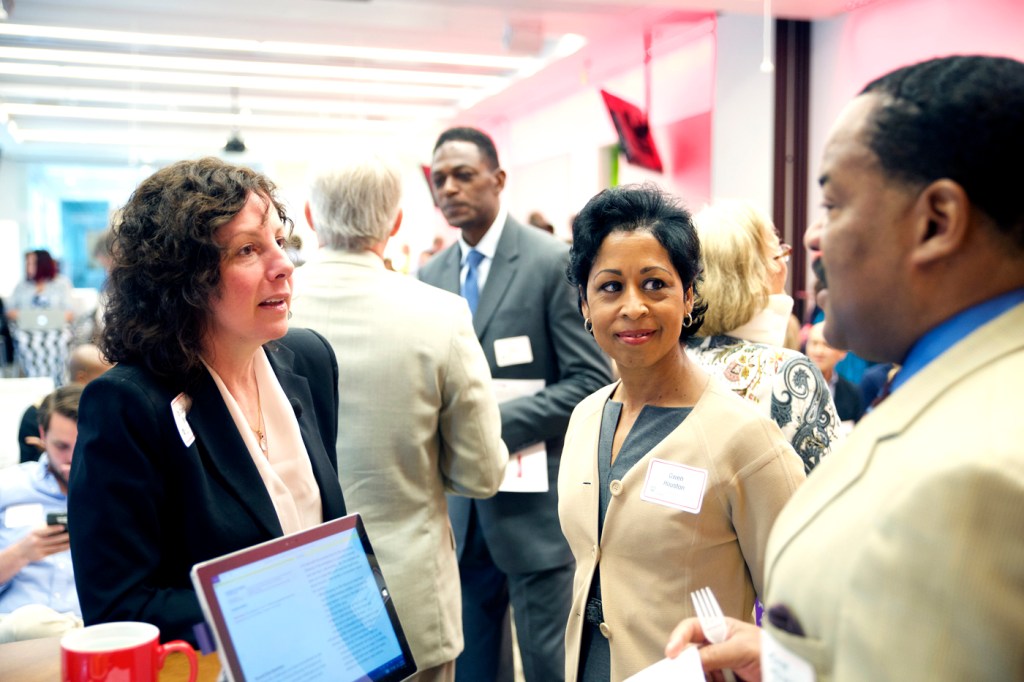In Seattle, leaders talk strategies to diversify tech sector

National experts and leaders from industry and academia convened Tuesday morning at Northeastern University-Seattle to discuss strategies and opportunities to broaden the pipeline of women and minorities in the technology industry.
More than 130 stakeholders from across Washington state attended the panel discussion, which was moderated by Carla Brodley, dean of the College of Computer and Information Science. The panel comprised Dean C. Garfield, president and CEO of the Information Technology Industry Council; Telle Whitney, co-founder of the Grace Hopper Celebration of Women in Computing Conference and the CEO and president of the Anita Borg Institute for Women and Technology; and Gwen Houston, general manager of global diversity and inclusion for Microsoft.

Northeastern University photo
Talent diversity and retention
Two primary themes emerged throughout the discussion: how to increase workforce diversity in the fields of science, technology, engineering, and math—known as the STEM fields—and how to retain that diverse talent. Diversity, the speakers said, means not only in race, gender, and nationality but also a diversity of thought.
Brodley said that to achieve these goals, it’s essential to reach people who haven’t yet considered fields like computer science as an academic track or career option. This involves encouraging students to explore computer science as an undergraduate, or inspiring professionals with bachelor’s degrees in other fields to pursue a graduate program in computer science.
“To broaden the pipeline, we need to show people they can be computer scientists when they weren’t thinking about it before,” she said.
Brodley said that based on her experience in academia, about 75 percent of people who take an introductory course in computer science move on to take other courses in computing. She noted that last year there were 1.1 million women and more than 400,000 underrepresented minorities who graduated college in the U.S., and if even some of those people could be motivated to try out computer science, “we could increase the talent pool tremendously.”

Northeastern University photo
Broadening the pipeline
As part of its commitment to widening the pipeline and addressing the Seattle region’s industry needs, Northeastern offers two master’s degree programs in computer science in Seattle—one of which is through the university’s ALIGN program. ALIGN is a master’s degree program that includes an experiential learning component and is specifically designed for professionals who want to transition into high-growth industries such as computer science, health informatics, or bioinformatics, but don’t have the necessary undergraduate degrees or work experience to match those industries. Northeastern has launched an ALIGN master’s degree program in computer science at its Seattle campus.
Nearly half of the Fall 2015 cohort of students in Seattle’s computer science programs are currently projected to be women, compared to 35 percent of students enrolled last year.
At the event, the panelists offered a range of insights and perspectives during their remarks and interaction with audience members during a Q&A.
“How do we make Seattle a place that not only attracts diverse talent but also nurtures it?” asked Houston, who stressed that equal emphasis must be placed on both recruiting and retaining females and minorities.
The speakers lamented that overall, middle school girls’ interest in STEM has been found to decline by the time they reach ninth grade. They said programs like Northeastern’s GAMES Initiative and the National Girls Collaborative Project are critical to attracting and keeping school-aged girls interested in these areas.
The panel discussion comes on the heels of Rev. Jesse Jackson’s visit to the Northeastern University-Seattle campus last week to discuss increasing diversity in the technology sector and the need for equality of opportunity and economic justice at companies in this sector.





